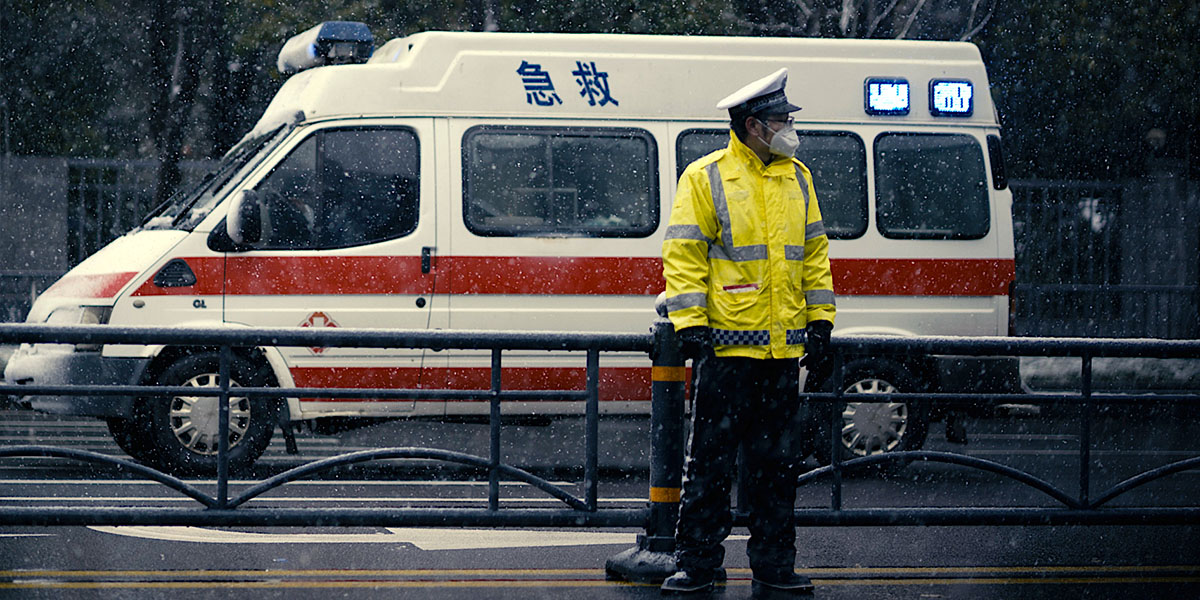76 Days, from directors Hao Wu, Weixi Chen, and an anonymous filmmaker, is a heartbreaking work of documentary vérité investigating the emerging COVID-19 outbreak at a single hospital in Wuhan, China, and their response from early February to April 2020, when Wuhan lifted their initial lockdown. Eschewing contextualizing features (narration, title cards, etc.), 76 Days places viewers alongside doctors and nurses as they struggle to control the spiraling implications of COVID-19, dealing with an influx of scared patients, a virus they do not fully understand, and diminishing resources. Though 76 Days proves a hard watch, it’s a profoundly visceral look into how one hospital dealt with the raging virus.
The film, directed by Chinese journalists (Weixi Chen and an anonymous filmmaker) and Chinese-American filmmaker Hao Wu (who edited the filmed material in the U.S.), spends time tracking individual patients through their COVID-19 diagnoses and recoveries, including an older man gently referred to as “Grandpa” and a pregnant mother forced to undergo a C-section because of her diagnosis. Yet the film is much more concerned with the doctor’s reactions to unfurling events than any single individual crisis. The doctors and nurses—covered head-to-toe in hazmat suits, gloves, and masks more in place in a sci-fi movie—may not have identifying features, yet they demonstrate a poignant humanity dealing with a number of patients, most lacking symptoms and failing to understand why they are being quarantined.
Nurses are often forced to telephone loved ones, explaining why their family member died and how to go about picking up any items they may have left behind (after being disinfected, of course). These scenes are presented through stark close-ups, as nurses in otherworldly outfits struggle to dial numbers on cell phones and talk through the layers of protective material they have on, all the while lifeless bodies lay in the background. It is, needless to say, an incredibly discomforting watch, as the catastrophe, and the amount of those infected, ramps up. Nurses are forced to lock the waiting room for fear that they will be overwhelmed by COVID-positive patients trying to get in. It’s a palpable fear, as no one really has any explanation for those infected, falling back on pleas to remain in the hospital, even though many patients are confused about their diagnosis.
Critics have been asked to “refrain from discussing identifying details contained in the film […] to avoid any potential government interference with the film,” yet that mandate is quite simple to adhere to, as 76 Days ultimately spends less time focusing on the specifics of its location, instead treating the hospital as a metonym for the larger outbreak in Wuhan. The hospital, and the staff, are largely anonymous because of the political implications, but also because they are one of many dealing with the escalating virus. While this approach may initially seem to dehumanize healthcare workers, 76 Days in fact accomplishes the opposite. You may not know what these frontline workers look like, or even their names, but you know that they care, putting themselves at risk every time they suit up.
While future filmmakers will be grappling with the fallout of COVID-19 for years and decades to come, contextualizing and dissecting the historical, social, and scientific implications of the virus, 76 Days emerges as one of the first works to directly address the pandemic that we now find ourselves in. It’s a staggering work that values immediacy over detached background information. As China continues cracking down on independent reporting on the virus, specifically in Wuhan, 76 Days is all the more remarkable for its access. While at times a brutal watch, with the film’s insistence on showing the ravages of COVID-19 in up-close detail, 76 Days will, I suspect, become a landmark document when talking about the virus and China’s initial response.
76 Days premiered at the Toronto International Film Festival.

